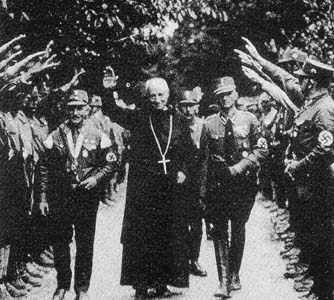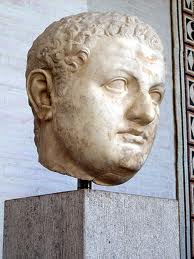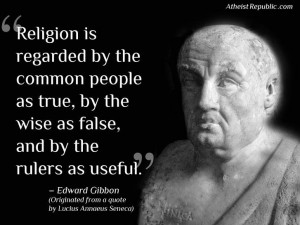
Was Christianity Roman Government Propaganda?
What drove Paul so ardently in his efforts? Did the Roman government employ Paul to mar the power of messianic Judaism, and particularly Nazarenism? Was the Roman government trying to stop a war?
Paul taught that the Jewish messiah was the Christ, who had already been and gone, maybe because Rome did not want hopeful Jews rallying under a yet to arrive militaristic Messiah who would challenge Roman rule.
Rome knew a revolt was brewing in Palestine in the 50’s and 60’s. The government sent many different procurators to Palestine to control the unrest, yet many of them were corrupt, which only made matters worse.
All Jews felt a connection with Jerusalem and the temple; they even sent money as an annual gift to the priests in the temple. The government was aware that many Jews in the Diaspora did not assimilate well with Gentiles in a political and social sense, and that made them suspicious of the Jews’ Palestinian connections and the religion that inspired their obvious differences.
Jewish extremists throughout the empire (such as Yeshua) promoted the subversive idea that their own Jewish king should govern the world on behalf of God and in place of Caesar. If the government could not pacify these Jews, it would set a dangerous precedent for other races to revolt. The government needed to keep control over the trade routes to Asia and Egypt. The government was probably frustrated at having to repeatedly use force to suppress Jewish extremists, as it was disruptive, expensive, and taxing on morale. Maybe the government thought that if it could undermine Jewish extremism using propaganda, it would prevent a whole world of hassle.
In an effort to achieve this, it is conceivable that Rome had a network of covert agents engaged in suppression of Jewish extremists, and that Paul was one of them. If so, there might have been many “Pauls” working as government employees. Paul wrote to a community in Rome to introduce himself, and it is obvious from his letter that this group already had some beliefs about a Christ, beliefs that they may have learned about from one of P aul’s co-workers.
aul’s co-workers.
The Roman government must have been worried that Judaism was attracting converts from Gentiles. Paul’s role may have been to stop the spread of the subversive religion. If so, Paul tried to infiltrate the Nazarenes to undermine them and their Messianic message. It could be that he passed information about the Nazarenes on to Roman authorities.
Paul’s “conversion,” in which “God’s” new ideas were revealed only to him, and by which he became the founding member of his own Christ fan club, was his rather dubious, yet ardently promoted, modus operandi.
This could explain why Paul wrote with such passion; he was desperate to sell his watered down, non-militaristic version of Judaism, one that downplayed the importance of the temple and all the Jewish ethnocentric antisocial practices. Paul’s (and the government’s) aim was to counter Jewish messianic fervor, which was building in momentum and needed to be quelled. They failed, because Jews in Palestine revolted in the war of 66 -70 CE.
What actual evidence is there that Paul was a funded insurgent? It is known that Paul was a Roman citizen, yet, if the account in the book of Acts is to be believed, Paul did not publicly reveal himself as such until he was about to be physically assaulted by Roman soldiers, which indicates that Paul was trying to norm with the community, and simultaneously hide his true identity. Being a funded agent would help explain how Paul managed to support himself financially, and undertake his ministry without doing any tent making.
It might also be why Paul hoped a financial gift to the Nazarenes in Jerusalem would be accepted; he was trying to endear himself to the Nazarenes using bribery.
Paul’s writings make it clear that he had little genuine respect for Pharisaic Judaism. Paul often insisted that the Torah was obsolete. He was, by anyone’s standards, over zealous in promoting his own theology, and too diligent in denigrating any Jewish beliefs that might be thought of as promoting Jewish exclusivity.
This idea makes clear why Paul not only promoted his new interpretation of Judaism, but also why Paul aligned himself with the non-religious administration of the Romans; the following is an extract from Paul’s letter to a Roman Jewish community:

“Let everyone be subject to the governing authorities…”
“Let everyone be subject to the governing authorities, for there is no authority except that which God has established. The authorities that exist have been established by God. Consequently, whoever rebels against the authority is rebelling against what God has instituted, and those who do so will bring judgment on themselves. For rulers hold no terror for those who do right, but for those who do wrong. Do you want to be free from fear of he one in authority? Then do what is right and you will be commended. For the one in authority is God’s servant for your good. But if you do wrong, be afraid, for rulers do not bear the sword for no reason. They are God’s servants, agents of wrath to bring punishment on the wrongdoer. Therefore, it is necessary to submit to the authorities, not only because of possible punishment but also as a matter of conscience. This is also why you pay taxes, for the authorities are God’s servants, who give their full time to governing. Give to everyone what you owe them: If you owe taxes, pay taxes; if revenue, then revenue; if respect, then respect; if honor, then honor.” (Romans 13:1-7 NIV.)
One could argue that Paul sounds more like a pro administration lobbyist than an evangelist.
This theory would explain the way Paul finished off his letter to the Philippians:
“All the saints salute you, chiefly they that are of Caesar’s household” (Phil. 4:22, KJV.)
Paul had contact with the Emperor Nero’s (Roman Emperor from 54-68 CE) family, and even permitted himself to speak on their behalf!
Paul being a Roman associate fits with the fact the book of Acts states:
“Now there were in the church that was at Antioch certain prophets and teachers; as Barnabas, and Simeon that was called Niger, and Lucius of Cyrene, and Manaen, which had been brought up with Herod the tetrarch, and Saul” (Acts 13:1, KJV.)
The earliest Christian community at Antioch boasted a member of Herod Antipas’ family, the pro-Roman Tetrarch who had murdered John the Baptist, and Paul (Saul) was associated with him.
 Paul being a government agent would explain why, in the book of Acts, he was repetitively roughed up by Jews, yet was never attacked by Gentiles. There is little doubt that fundamentalist Jews would have viewed Paul as a charlatan.
Paul being a government agent would explain why, in the book of Acts, he was repetitively roughed up by Jews, yet was never attacked by Gentiles. There is little doubt that fundamentalist Jews would have viewed Paul as a charlatan.
Paul’s so-called “arrest” by Roman troops in Jerusalem does not necessarily mean that he was not in league with Rome. Paul was, in fact, being protected. Things had got a little out of control and Paul became a source of civil unrest, a diehard dogmatist causing trouble wherever he went. Instead of undermining Judaism, Paul incited Jews to the point of violence, something Rome did not want. The “arrest” was, in fact, for Paul’s own safety. If Paul had not been arrested, Jews, Jesus’ own people, might have killed him.
Reading between the lines, Paul was never treated by the Romans like a prisoner. Rather, there were remarkable Roman resources used to protect him. Paul had to be moved to Rome, as it was the best place for his own protection.
If Paul was a spy, he was a cog in the wheel of a cunning government plan, and he knew that he was promoting manufactured dogma as a means to an end. This would mean that Rome, via Paul, created the Christ, a benign pacifist Messiah.
We do not hear from Paul after he is placed under so called “house arrest” in Rome in the early 60s. He probably wrote some letters from Rome, and then disappeared from the historical record. Palestine in the early 60’s was nearly out of control. The anti-Jewish propaganda project had not worked, and the time for talk was over; the military had to be brought in. Paul had become redundant. The government no longer needed him. There is a Christian “tradition” that Paul was executed in Rome, but there is no valid reason why that would have happened, and no good evidence that it did.[1]
Rome was not into controlling people’s minds or interfering with their belief systems unless they started impacting on Rome’s ability to garner supply of goods, services and money. Jewish messianic beliefs, such as those entertained by the Nazarenes, did just that.
If Paul’s project had been successful, the first (66-70 CE) and the second (132-5 CE) Jewish wars would have been averted. Yet it was doomed to failure. People who have been bought up in a strong religious faith rarely change their allegiances. A modern analogy might be Christian missionaries trying to promote Christianity in a strongly Islamic country such as Afghanistan.
Thijs Voskuilen and Rose Mary Sheldon, who co-wrote “Operation Messiah,” came to a similar conclusion about Paul. They postulated that Paul was:
“…supporting the imperial structure, benefiting from it, cooperating with it, often saved by it. The end product for Rome was exactly what it wanted – a loyal, other –worldly, spiritual movement that was completely divorced from Palestinian revolutionary movements, from Jewish nationalism and from any challenge to Roman imperial authority. Its followers were supposed to pay taxes and be loyal citizens of the emperor.”
It is quite possible that Jewish and Gentile intellectuals, also working for the Roman government, after the first Jewish war, and after Paul’s failure, wrote the Gospels. The fact that belief in the divinity of Jesus arose in many diverse areas of the empire a number of decades after Jesus’ death suggests that it came from a central, well-coordinated source, and it most definitely was not Yeshua’s Jewish friends in Jerusalem. This would explain why the true identities of all four Gospel authors are unknown.
The Roman led spin-doctors, who could have been the original authors of the Gospels, knew that ideas could be just as effective as force. They tried to weaken Judaism by infiltrating and diluting it with Gentiles, just like Paul tried to do with his Christ story. They too told a tale that the Jewish Messiah had already been and gone, and he was not a political activist, but a benign religious preacher who was a spiritual intermediary between God and man. If the idea caught on, there would be no more Messiahs and no more revolts.
It could be that Yeshua’s real story, that of a brave Nazarene martyr, was turned around 180 degrees to create an entity that was the very opposite of what the real man was. Jesus was made to say
“Blessed are the peacemakers,” “turn the other cheek,” “love your enemies” and “pay your taxes,” which, if believed and followed, meant you did not cause trouble and you obeyed your Roman superiors. To promote this would have been a lot easier than having to use the army again.
In those times it was easier to push propaganda than it is today, because the public was less informed and less able to check out the facts. These publicists twisted the knife to wound Judaism by blaming Jesus’ death on the Jews and making Romans look like the innocent good guys. It was made out that Jesus’ own people had effectively killed their own Messiah.
The government hoped the story of the new idol would convince people that true spirituality and the promise of eternal life were synonymous with getting along with them. In those days it was always the winners who wrote the history.
Ever since ancient times, people in power have tried to control popular opinion, and have not hesitated to flagrantly manipulate the facts. The creation of Christianity by the Romans appears to be one such an example.
Creating a new religion, with a charismatic central hero figure, and embedding guilt and fear while castigating the enemy and promising believers an afterlife, is just brilliant! Consider how well it has lasted until now.
The Romans, who controlled most of the known world, wanted to keep control. They were smart. They saw how powerful the Jewish religion was amongst the Jews, s o they used that knowledge to their own advantage. They would not have felt guilty about what they were doing. They probably just saw this as an effective strategy for delivering change, exerting their authority, and keeping the peace.
o they used that knowledge to their own advantage. They would not have felt guilty about what they were doing. They probably just saw this as an effective strategy for delivering change, exerting their authority, and keeping the peace.
In modern times, the use of tactics like this is called propaganda, disinformation or psychological warfare, and it continues to this very day. Consider the scores of governments who have used a version of “God” to justify war.
It is fascinating to imagine these subversive tricks as part of the first-century Roman government machine, and jaw dropping to realize that the dogma has survived until today, without being exposed for what it really is. This propaganda is still coloring the way people, and in particular trusting Christians, look at the world.
It is ironic that the Gospels, purporting to be so truthful, were so manufactured, and that they became one of the most successful literary enterprises ever undertaken in world history.
The politically motivated spin may have been very clever, but it did not achieve its original aims. Just as Paul failed to stop the first war of 66-70 CE, the Gospel authors too failed in their original intention, as they did not prevent the second major war with the Jews in 132-6 CE.
The reader may be wondering why, if this is true, it is often claimed that the government persecuted Christians, particularly as there is a “tradition” that Domitian (Titus Flavius Dominatus Augustus, Roman Emperor from 81 – 96 CE) did just that, but the evidence for this is weak.[2]
The fact is persecution of Christians was not a policy of the state until over a century later, when it did occur in isolated areas, and only for relatively short periods.[3] Generally speaking, Rome was tolerant of all religions, including Christianity. In those days the ideas of one government (as controlled by one emperor) were often completely different to the next emperor. After the Flavian dynasty (the rule of Vespasian, Titus and then Domitian) ended with Domitian’s assassination in 96 CE, there was a brand new emperor. Persecution happened sporadically many years later, but usually only if Christians refused to worship the state’s gods. By this time the militaristic ambitions of peasant Jews had been finally and definitively crushed in the second Jewish war of 132-6 CE, and there were different agendas on the government’s mind.[4] Moreover, some stories of persecutions of Christians by the Roman government are now recognized as exaggerations and fabrications.
The significance of this is enormous. If this is true, Christianity has been the most monumental fraud ever inflicted on humankind.
[2] http://bibleworld.com/domper.pdf
[3] http://www.amazon.com/The-Myth-Persecution-Christians-Martyrdom/dp/0062104527
[4] http://www.religionfacts.com/christianity/history/persecution.htm
References:
Cresswell, Peter 2010 “Jesus the Terrorist” O books, Winchester, UK.
Eisenman, Robert H. “James the Brother of Jesus: The Key to Unlocking the Secrets of Early Christianity and the Dead Sea Scrolls”
Thijs Voskuilen and Rose Mary Sheldon co-wrote “Operation Messiah”
http://www.angelfire.com/wi/famtree/romned.html
http://www.uhcg.org/HoI/James-Bro-of-Jesus.html
http://blogcritics.org/culture/article/jesus-pacifist-shepherd-or-zealot-warrior/
http://bhairavah.blogspot.com.au/2009/11/political-jesus.html
https://itunes.apple.com/us/podcast/librivox-wars-jews-by-josephus/id345414791
http://www.youtube.com/watch?v=DLypbbijk2I









